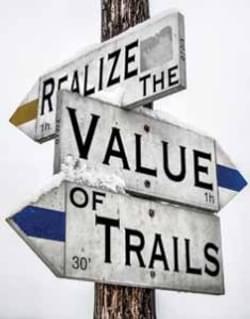




I have had two great epiphanies in my life, and both of them were thanks to trails. The first epiphany came as a result of a mountain biking accident I had in June of 1991.
by Mike Passo, Executive Director, American Trails

I have had two great epiphanies in my life, and both of them were thanks to trails. The first epiphany came as a result of a mountain biking accident I had in June of 1991. I was working at a wonderful YMCA camp in Northern Wisconsin, and some friends and I had decided to sneak in a quick mountain bike ride before our night time duties. I had to turn around early to get back to my cabin, and on the way back to camp I went over a berm too fast, flipping over the handlebars in the soft sand on the back side, landing on my back, and shattering my T 10 and 11 vertebra (belly button level), instantly losing feeling in my lower extremities. Long story short, I had pinched my spinal cord at the level of the break, causing permanent paralysis of everything below my waist. It was later, as I lay in my hospital bed thinking—between Hogan’s Heroes and The Price is Right— that I had the epiphany. I was understandably upset. But it was WHY I was upset that was the epiphany. I was not lamenting the fact that I had no feeling below my waist (fairly important, you’d think, for a 22 year old boy), nor was I thinking about how I probably would never walk again. I was thinking, “How the heck am I going to mountain bike again?”
That is when the epiphany hit me — people define themselves by how they recreate. I was truly upset by not being able to envision myself doing the activities that I rely on to re-create myself on a consistent basis. Doctors don’t have pictures on their office walls of themselves bent over an operating table. They have pictures of themselves holding up their trophy walleye, or a beautiful overlook from their epic ride on the Hatfield McCoy trail system. We define ourselves, and who we are, by our recreation.
Over the years, I have developed my trail use habits to fit my needs. I did figure out how to mountain bike again with a crazy contraption called a One-Off tricycle. I discovered kayaking and canoeing on our nation’s best water trails, and I have had unparalleled experiences on trails that have helped me to re-create myself, including when three orca whales swam directly underneath my kayak. If that does not change you, nothing will. I want to make sure everyone has opportunities like this.
My second epiphany happened earlier this year when I, as the new executive director of American Trails, was deep in the process of studying how our organization can affect real and lasting improvements in the trails world. It became crystal clear to me that trails are the single most critical element in providing the opportunity for people to re-create themselves. Trails allow many of the most common recreation activities to exist. And by association, they enable us all to maintain our identities. If, for any reason, we take away people’s ability to use trails, it has dramatic effects on their mental and physical wellbeing.
The name of this series, “Breaking Down the Silos,” is a metaphor for how we can wall ourselves off by being single-minded about our ownsilo, or area of focus. This has happened to many of our organizations over the years. But by breaking down these metaphorical silos, we can work cooperatively toward our many common goals within the trails community. To me, the greatest of these common goals is making sure everyone has access to that most important of things, their ability to recreate— to re-create themselves.
It’s critical to personal health, community health, and the overall economic health of our nation. Where would we be without trails? It’s hard for me to imagine. Let’s rededicate ourselves to building our trails infrastructure, in a way that avoids inadvertently taking away any person’s, or any group’s, access to trails and the recreation opportunities that trails provide.
posted Nov 1, 2023
A discussion on greenways and trails with landscape architect Chuck Flink, author of The Greenway Imperative and the original chair of American Trails
Celebrating Women Who Care for Trails
posted Mar 14, 2023
Cathy Corlett, American Trails Director of Strategic Communications, joined Trailkeepers of Oregon's women-only trail work party to find out more about the work being done and the women who opt to spend their Sunday working on the trail, even when the weather conditions are less than ideal.
RTP - Workforce Development, Equity, and Climate Resiliency
posted Sep 3, 2021
The Recreational Trails Program directly addresses our desire to put young people to work, provide equitable access to nature, and provide resilient responses to natural disasters
1,262 views • posted 05/01/2018